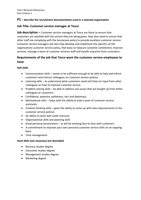Summary
Excluding chapter 8 and 14.
,Chapter 1 Introduction to Finance for Entrepreneurs
The entrepreneurial process is divided into 3 division, with the goal to create value.
• Developing opportunities
• Gathering resources
• Managing and building operations
A successful entrepreneur:
• Sees and seizes a commercial opportunity
• Tends to be doggedly optimistic (perhaps even to a fault)
• Plans to obtain the physical, financial, and human resources needed for the venture to
succeed
Whereas, success will be unlikely if you “are seldom able to see an opportunity, until it
ceases to be one”, “view the glass as being half empty instead of half-full” or “are paralyzed
by a fear of failure.”. Several trends suggesting possible entrepreneurial innovations are
societal; demographic; technological; emerging economies and global changes, and crises and
bubbles. But what is the role of entrepreneurial finance?
Entrepreneurial Finance:
• Application and adaption of financial tools and techniques to the planning, funding,
operation, and valuation of an entrepreneurial venture.
• Focuses on the financial management of a venture as it moves through its life cycle,
beginning with its development stage & continuing through to when the entrepreneur
exists or harvests the venture.
Venture Life Cycle: stages of a successful venture’s life from development through various
stages of revenue growth, these stages are:
1. Development Stage
period involving the progression from an idea to a promising business opportunity.
2. Startup Stage
period when the venture is organized, developed, and an initial revenue model is put in
place.
3. Survival Stage
period when revenues start to grow and help pay some, but typically not all, of the
expenses.
4. Rapid-Growth Stage
period of very rapid revenue and cash flow growth.
5. Maturity Stage
period when the growth of revenue and cash flow continues but at a much slower rate
than in the rapid-growth stage.
, But how to finance this startup? The selected financing definitions:
Seed Financing: funds needed to determine whether the idea can be converted into a viable
business opportunity.
Startup Financing: funds needed to take the venture from having established a viable business
opportunity to initial production and sales.
Venture Capital: early-stage financial capital often involving substantial risk of total loss.
Venture Capitalists: individuals who join in formal, organized firms to raise and distribute
venture capital to new and fast-growing ventures.
Business Angels: wealthy individuals operating as informal or private investors who provide
venture financing or small businesses.
Investment Banker: individual working for an investment bank who advises and assists
corporations in their security financing decisions and regarding mergers and acquisitions.
First Round Financing: equity funds provided during the survival stage to cover the cash
shortfall when expenses and investments exceed revenues.
Second Round Financing: financing for ventures in their rapid-growth stage to support
investments in working capital.
Mezzanine Financing: funds for plant expansion, marketing expenditures, working capital,
and product or service improvements.
Bridge Financing: temporary financing needed to keep the venture afloat until next offering.
Initial Public Offering (IPO): a corporation’s first sale of common stock to the investing
public.
Seasoned Securities Offering: the offering of securities by a firm that has previously offered
the same or substantially similar securities.











